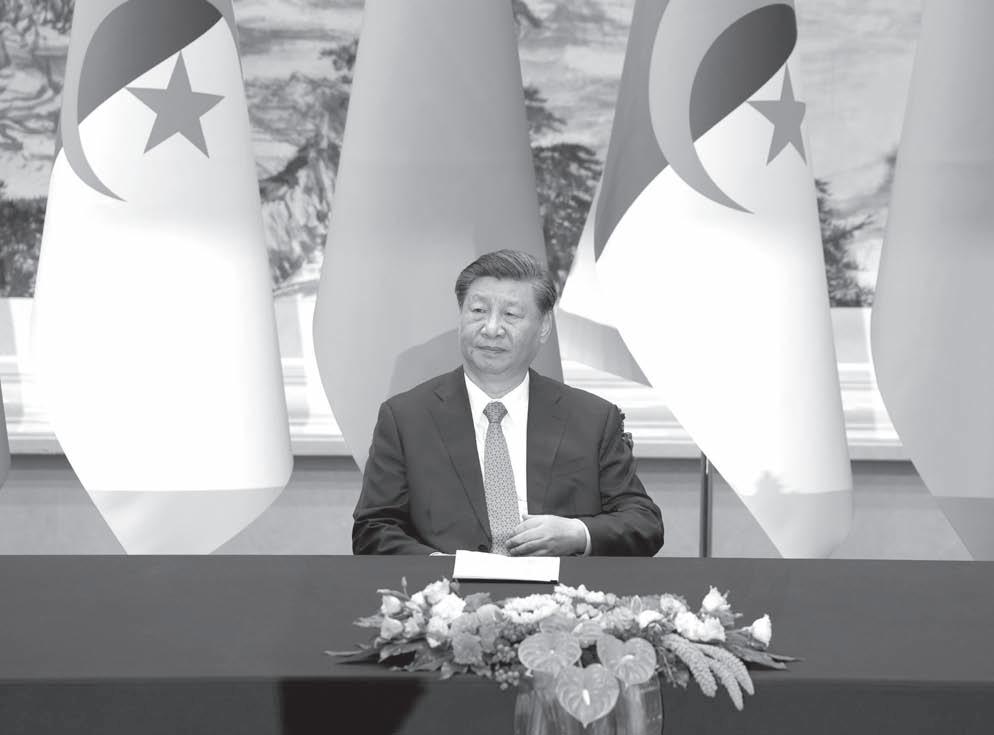
7 minute read
Xi’s private-sector propaganda push runs into wall of skepticism
By Bloomberg News
The Communist Party and the government issued a rare joint statement late Wednesday, with 31 measures to improve conditions for businesses, including pledges to treat private companies the same as state-owned enterprises and to consult more with entrepreneurs before drafting policies.
W hile the move by President Xi Jinping’s government won backing from Tencent Holdings Ltd.’s billionaire co-founder Pony Ma and other Chinese businesses, it was greeted with skepticism by Chinese markets looking for more concrete measures to revive sentiment. With Beijing’s official growth target of around 5 percent now at risk, urgent stimulus measures are high on investors’ wish lists.
It’s more of a principal framework, investors are hoping for more specific stimulus measures such as loosening in property policies and more fiscal spending,” said Alan Li, chief investment officer at Atta Capital Ltd. Any lift to financial markets from Beijing’s signals will likely be short-lived, he said.
Hong Kong’s Hang Seng Tech Index—which includes heavyweights like Alibaba Group Holding
Ltd. and Tencent—traded about 0.3 percent lower around midday, erasing earlier gains of as much as 1.7 percent. A gauge of Chinese stocks traded in Hong Kong pared earlier advances of as much as 1.7 percent to trade at 0.4 percent just before midday.
Businesses have been bruised by years of tight coronavirus restrictions, which ended suddenly in December, as well as unpredictable regulations in sectors like technology and education. While Beijing appears ready to lift at least some of the plethora of privatesector restrictions, it will be hard to repair investor confidence and recoup corporate losses.
Once-dominant private sector champions like Ant and Alibaba have shrunk drastically after years of constant scrutiny and business curbs, with Alibaba itself preparing to break into six separate units.
The almost two-year crackdown on tech firms appears to now be at a close, with Beijing imposing fines of over $1 billion on Ant and Tencent this month. Underscoring the sector’s wish to move on from its crisis, Tencent’s Ma penned a rare opinion article in state media late on Wednesday echoing Beijing’s statements on the importance of the private sector.
Other Chinese business executives, like Li Shufu, the billionaire founder of Zhejiang Geely Holding Group Co., and Zong Qinghou, the chairman of leading beverage company Hanzhou Wahaha Group Co., also backed Beijing’s pledges.
The public pledges of support from billionaires on Thursday belie the extent to which most entrepreneurs have retreated from the day-to-day running of their empires and shied away from pursuing growth, fearful of drawing Beijing’s gaze.
Li Xuetong, a fund manager at Shenzhen Enjoy Equity Investment Fund Management Co., said while Beijing’s signals should ease fears that the government was becoming more tolerant to slower economic growth, the move is unlikely to result in a quick rebound in prospects.
“ This is just one step in an accumulation of factors to turn around expectations for the business environment,” said Li. “It isn’t realistic for one document to be a game changer.”
Weakening growth
CHINA’S weakening economic recovery this year has sent a chill through global markets, with Beijing’s limited steps so far—ranging from lower interest rates, easier access to credit and a series of measures to kickstart the moribund housing market—doing little to bolster growth.
Businesses are still waiting for signals from Xi’s new economic team that the policy environment will be more transparent and predictable. While Xi has repeatedly insisted that economic development is the Communist Party’s “top priority,” his government has clearly made protecting national security a central focus.
Beijing’s recent clampdown on business consultancies like Bain & Company caused unease in global markets, around the same time that the government made revisions to a broadly worded antiespionage law. Since then, though, officials have had a series of meetings with high-profile executives to repair the damage to business sentiment.
While removing existing business obstacles would be beneficial to business confidence, taking concrete measures to stimulate consumer confidence and establish a clearer regulatory framework would be even more critical,” said Maximilian Butek, chief representative at the Delegation of German
Industry & Commerce in Shanghai.
“Ultimately, restoring trust in a predictable business environment hinges on concrete actions rather than words.”
Business challenges
PRIVATE firms still face a number of challenges, including higher financing costs and lack of access to bank loans compared with stateowned counterparts. Many are also constrained because of unpaid bills from supplying services and products to government-related entities, as local authorities’ finances deteriorated.
A number of economists have called on the government to adopt more demand-side stimulus measures, including handing out consumption vouchers or cash subsidies to residents—something officials have been reluctant to do. Instead, Beijing has offered a vague guideline to boost consumption of home appliances and furniture, and extended a tax break for new energy vehicles purchases through 2027.
The demand-side support, especially how to raise household expectation, as well as stabilize a job market outlook, that’s also very key to restore confidence in household sector,” Betty Wang, a senior economist at Australia & New Zealand Banking Group, said in an interview on Bloomberg TV. “The latest data released shows a very clear weakness in the private and household sector.”
The government will boost support for private companies in share listings, bond sales and overseas expansion, according to the official statement Wednesday. It will also continue to cut market entry barriers for private firms and help resolve unpaid bills owed to smaller businesses.
“ It won’t turn sentiment around overnight, but private entrepreneurs do take these signals seriously, so this and similar statements from top leaders make a difference,” said Gabriel Wildau, managing director at advisory firm Teneo Holdings LLC in New York. “A similar statement directly from Xi would have an even greater impact.”
Traffic jams, long queues, delays: Are we there yet?
Cruz also said that the active transport sector, despite being championed by the transport agency, has yet to see any “significant developments” and is even facing a “threat of regression.”
“Since Bautista took office, we have actually yet to see a holistic plan as to where he wants to bring the DOTr,” Cruz said.
Honeymoon period is done CRUZ thinks the agency ought to conduct a review and create a masterplan for a true “transportation system,” one that he describes through the journey of a regular commuter.
“ What we’re missing is a transportation system, an environment where all the modes of transportation are carefully coordinated with each other. This is not rocket science, all the government needs to do is imagine the journey of the commuter when they step out of their homes,” he said.
For instance, a commuter going to work may take his bike, a tricycle, or a jeepney to reach the nearest train or bus station. He may then walk leisurely to his office through pedestrian-friendly walkways and sidewalks.
However, this is not the case for the Philippines, yet, Cruz said.
“ That’s what we’re missing. They’re building all of these things in silos,” he lamented.
Cruz noted that the government has to be reminded that the majority of Filipinos do not own a vehicle.
“ We have to balance it out. After years of prioritizing private vehicles, we have years of catching up to do for public transportation so that it will be more responsive to the needs of Filipinos,” he said.
He urged authorities to take action, especially for the short term, as other mass transportation projects like railways take a decade to complete.
“The kid gloves are off. We are way past the honeymoon period of the Marcos administration. The period to say that they inherited a problematic sector is over,” Cruz said.
Whole of government
MEANWHILE , to be fair, it is not only DOTr that should be accountable for the transport projects of the government, according to Cruz.
“ The DOTr isn’t the only national government agency that is in charge of the delivery of these things. The reality is that they need to work with other agencies like the Department of the Interior and Local Government, the Department of Public Works and Highways, the Metropolitan Manila Development Authority, and even the local government units. There’s much to be desired in terms of coordinating all of these bodies,” he said.

Cruz added: “Marcos would always say that it should be a wholeof-government approach and yet we’re not seeing a whole-of-government approach in tackling transport issues.”
Benadana agreed, lamenting that some agencies even hinder developments in the sector, citing the MMDA’s policy against bikes. We have to capacitate the offices that implement. But if there’s no political will to make things happen, it’s hard to see it to fruition,” she said.
Cruz noted that once govern- ment offices stopped working in silos, then the administration can “create solutions that make sense.”
These solutions, Benadana noted, should be measured by how much they have benefited ordinary commuters. “ There has to be a direct effect on the lives of commuters—better commutes. There has to be performance metrics in measuring the improvement in the lives of commuters,” she said.
Priority areas
BAUTISTA acknowledged that there is much to be done to help provide Filipinos a better transport industry, especially since funding is a main issue for the government.
The transport infrastructure projects require huge funding. We sought financing through publicprivate partnerships, private investors, international financial institutions and foreign governments. We also want to modernize existing and future projects. For this, we collaborated with other agencies such as the Department of Information and Communications Technology and the Department of Science and Technology, among many others,” he said.
Bautista noted that the DOTr will continue to put premium on the privatization of the Naia, the partial opening of the LRT 1 Cavite Extension, and the full construction of the subway and the NSCR this year.
Priority shall also be given to the construction of at least 500 kilometers of bike lanes in urban centers and the continued implementation of the PUVMP.
PRESIDENT Ferdinand R. Marcos Jr. urged the National Security Council (NSC) and the National Intelligence Coordinating Agency (NICA) on Friday to continue to protect the country against “national security threats,” which now include cyber attacks and climate change.
D uring the joint anniversary celebration of the NSC and the NICA at the Philippine International Convention Center (PICC), Marcos added cyber attacks and climate change to the list of threats the country faces, which includes issues on territorial integrity and sovereignty; terrorism and local communist insurgency.
Also worrisome, he said, are global developments and shifts,” which can affect the country.
L eft unchecked, these threats, the President said cause public disorder and even chaos.








